Star Tribune
Survivor who says she was sex trafficked at a Brooklyn Center Super 8 is now suing the hotel and its operators
The 15-year-old girl was given the illusion of safety and comfort but instead lived a life of horror for half a year in 2013.
A group of sex traffickers “kidnapped” the Minnesota girl, threatened her, advertised her body online and forced her to have sex for money at a suburban hotel, according to a group of attorneys now representing the survivor.
“After acquiescing to her traffickers demands under the constant threat of violence, she began to find herself forced to do increasingly depraved things, in increasingly depraved locations, such as the Brooklyn Center Super 8,” attorney Jeffrey Monpetit wrote in a federal civil complaint filed against managers of the hotel in which the girl, identified only as T.S., endured repeated torment.
First filed late last year, T.S.’s lawsuit is leaning on two federal laws that allow victims of sex trafficking to hold businesses civilly liable for facilitating their abuse. Now 26, T.S. is suing Wyndham Hotels & Resorts, Inc., Sarah Hospitality, Inc., Wyndham Hotel Group, LLC and Super 8 Worldwide, Inc. — all entities with varying degrees of control and oversight of the Brooklyn Center Super 8 at which the alleged sex trafficking took place.
Erica MacDonald, a former U.S. Attorney for Minnesota who is now leading the legal team defending the hotel management group, wrote in a recent response to the lawsuit that the defendants “deny any liability for sex trafficking.” She previously cast doubt on T.S.’s lawsuit by saying it relied on news stories, online travel reviews and general information that was not enough to show that Wyndham interacted with the traffickers or should have known that T.S. was being trafficked at the hotel.
But T.S. won a key legal victory recently when Chief U.S. District Judge Patrick Schiltz refused to dismiss the case, instead ruling that the survivor had “plausibly alleged” Wyndham and its franchisee, Sarah Hospitality, facilitated her traffickers and benefited from her harm.
“We are very pleased with Judge Schiltz’s ruling, we look forward to proceeding with discovery and the eventual trial of our client’s case,” Monpetit told the Star Tribune last week. “We are also happy for our client and what the ruling means moving forward for her and the many other victims of sex trafficking.”
The Star Tribune left a message seeking comment from Wyndham, as well as information about the company’s training and policies for identifying and stopping suspected sex trafficking.
Star Tribune
Inmate’s death at Moose Lake prison under investigation
Minnesota corrections officials are investigating after an inmate was found dead at the state prison in Moose Lake.
The 37-year-old’s cellmate found the man unresponsive in their room about 10:40 a.m. Tuesday, according to a news release Wednesday from the Corrections Department. Staffers immediately started life-saving efforts, but those efforts failed.
The department’s Office of Special Investigations is looking into the death, with help from the Midwest Medical Examiner’s Office. The inmate’s identity was being withheld until notification of family.
Star Tribune
Minnesotans join Smith, AOC in unveiling affordable housing bill

Joined by Minnesota affordable housing groups, Democrats Sen. Tina Smith and New York Rep. Alexandria Ocasio-Cortez unveiled a bill Wednesday that they say would create more affordable housing across the country.
The “Homes Act” would establish a housing development authority within the U.S. Department of Housing and Urban Development that would build and maintain a stock of permanent affordable housing. Smith said housing supply is far behind demand.
“Our proposal would serve renters, and homebuyers alike, providing millions of Americans in rural and urban communities with more options for a quality, affordable place to call home—with the sense of stability, security, comfort and pride that should come with it,” Smith said in a statement.
Her bill would authorize $30 billion in federal spending a year, with 5% of that set aside for tribal communities and at least 10% for rural communities, along with a revolving loan fund. Noah Hobbs, the strategy and policy director of One Roof Community Housing in Duluth, said that rural requirement will especially help in greater Minnesota.
“Oftentimes when bills get made either in St. Paul or D.C., they leave out greater Minnesota or greater America,” he said. “This rural set aside is really huge in helping us do more work than what we’re already doing. So we’re doing about, on average, 20 homes a year, either acquisition rehab or new construction. And so we’re hoping that this will help accelerate that.”
He said he thinks the bill will help not only in Duluth but also in places like Floodwood, Grand Marais, Grand Rapids and smaller municipalities between Duluth and larger cities.
Research from New York University, University of California at Berkley and the Climate and Community Institute estimates that the bill could build and preserve 1.25 million housing units, which would include 876,000 units for low income households, according to a joint memo from Smith and Ocasio-Cortez’ offices on the bill.
The bill would also help local communities address housing needs by helping to finance real estate acquisition or conveying property to public housing authorities, nonprofits, local governments, community land trusts and tenant or resident owned cooperatives, the memo continues.
Star Tribune
Lilacs around Minnesota are blooming once more due to strange, stressful weather

One of Minnesota’s favorite spring flowers are blooming again in late summer, a sign of stress from the extreme swings in Minnesota’s weather over the past several years.
Many lilacs across the Twin Cities have sprouted out their purple and pink flowers for a second time this year during an unseasonably warm September. The re-blooming is unusual for lilacs and can be unsettling to see, said Julie Weisenhorn, a professor and the horticulture educator at the University of Minnesota Extension.
“It’s not something we’d call ‘normal’ but it’s something we’ve been seeing now over the past few years,” Weisenhorn said.
When trees and plants suffer from blights or pests, or are stressed by droughts, floods or other phenomena, they sometimes produce an overabundance of seed. It’s a way that they’ve evolved to ensure that, if they do succumb, their progeny has a chance to live, Weisenhorn said.
So during droughts, oak trees may produce a super-crop of acorns. And lilacs will sometimes produce a second bloom in the fall.
Minnesota is not experiencing a drought right now. The summer of 2024, warm September aside, has actually been the most typical weather season the state has experienced in years.
“Sometimes it takes a a little while for plants to react,” Weisenhorn said. “So you have to think back to last year and even the year before last, and realize how stressed these plants were doing those extreme dry summers, and then going through a strange winter with no snow and very little cold.”
That drought was followed by one of the wettest three-month stretches ever recorded in Minnesota from April to June, she said.




